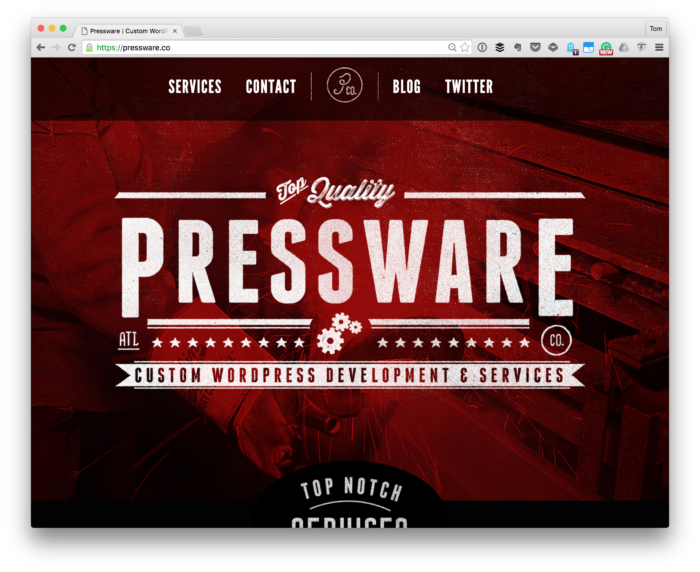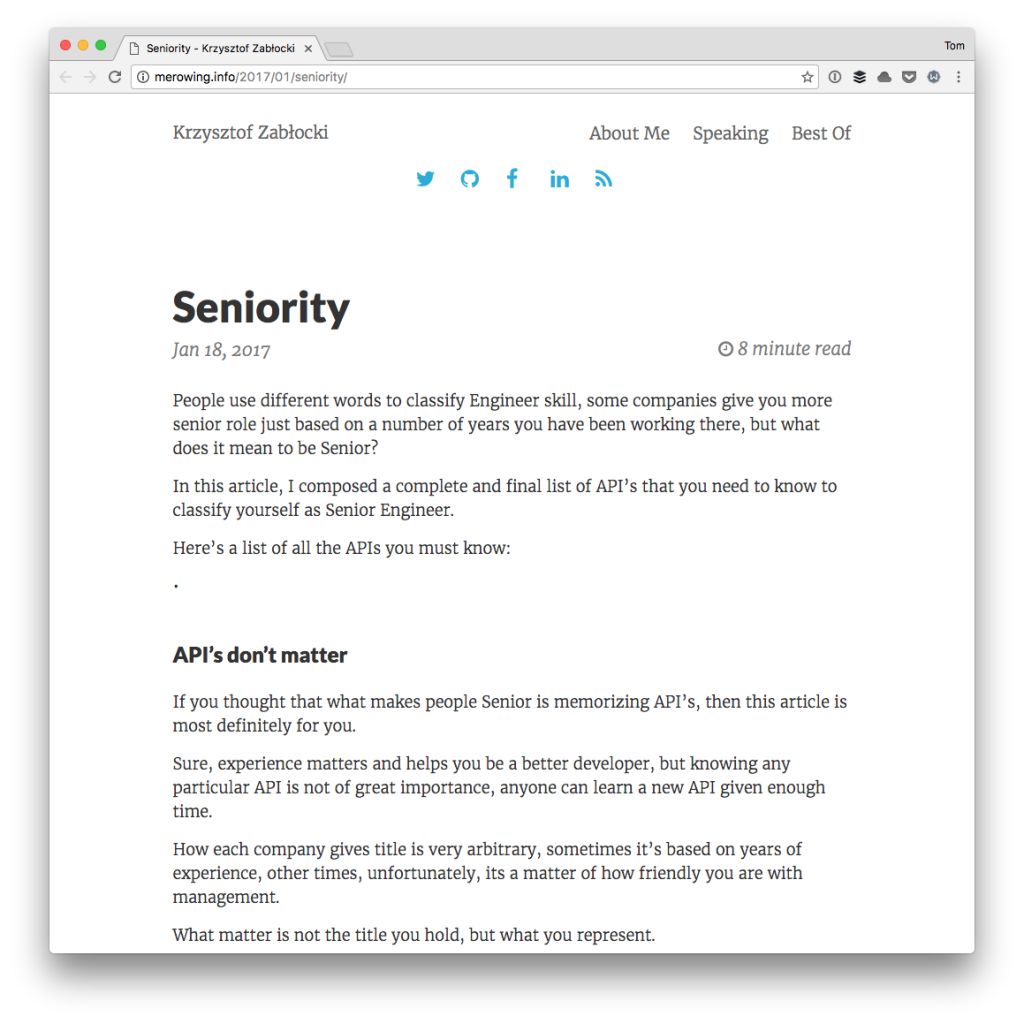I don’t write much about running a business on this blog, though it’s something I’m looking to change in 2017. So why not start now?
One of the conversations several of my friends and I have been discussing is finding quality people to employ (and this can be via contracting, full-time, part-time, whatever). And each of us – like any other business – have our criteria.
A topic that has come up is the stigma that’s attached to the idea of a “senior developer” or a “senior” anything for that matter.

The way that I’m currently running Pressware is simple:
- I have two contractors. One is a developer. One is an implementer. It suits the needs of the business perfectly.
- I have, like any organization who wants to be on the up and up with their taxes , a CPA. I also have a part-time person who helps me keep my books.
- My role has changed into both software development and business management (and I’m still figuring out how to do that – thank God for people who have wisdom they are willing to share).
The way in which we all run our businesses vary (and some of these firms include Reaktiv, Sandhills, Zao, and MemberUp), but there are a few things that are common in a recent discussion: What is a senior developer in WordPress?
A Senior Developer in WordPress
First, I think it’s important to read this article that Josh shared (which he got from Rachel). It makes some really good points all of which I believe are applicable to any senior position.
- Be reliable,
- Be flexible,
- Be pragmatic,
- Work well with others,
- Lead by example,
- Learn from others,
- Mentor others,
- Fight for healthy culture
And yeah, it all sounds good and perhaps even easy. But if it were, would there be a need for such an article? I digress on that point.

But when it comes to senior development, I think it can vary a bit from company to company.
Seniority in Pressware
For me, a senior developer in WordPress who is specifically focused on plugins (since that’s what I do) would have the following attributes:
- Familiarity with object-oriented programming principles and the foundational WordPress APIs (or know where to look to find them).
- Self-disciplined enough to be given a task and then to be able to solve the problem by breaking it down into more manageable tasks (divide and conquer, etc.).
- Willingness (if it’s not already in place) to learn to branch, to merge, and to deploy to staging, small feedback loops, and iterating before even touching production.
- Able to be autonomous in their work. That is, a job comes in, and that person is selected to be the lead on the job, then I expect them to embrace the “lead” aspect of it fully.
- The desire to fully understand the problems they are solving versus looking for a solution, copying and pasting it, and then moving on to the next task.
Sure, there are a few more, but those are the big ones. In fact, I’ve asked my latest contractor for projects in which he’s the lead if he’d embrace the leadership aspect to the point where he tells me which tools he’d like to use and the rationale as to why.
The reason for this is because I recognize that after ten years of working in the industry, there are going to be things the generation behind me are going to be familiar with that I’m not.
And this is exactly is how we were ten years ago, right? We knew things our superiors didn’t and not being heard when there was a simpler solution is frustrating.
That’s not the kind of business I want to run.
On the flipside, being involved in the industry for a bit longer than those who are younger give us the ability to provide mutually beneficial advice that can help them bypass mistakes we’ve made. I think they call that wisdom (though I don’t know if I’d consider myself wise ).
What is Seniority in WordPress Development?
With all of that said, the skills that I think are worth having as a senior developer in WordPress are listed above.
But do titles really matter? For Pressware, no. At least not where the company is today. But I get it when it comes to other organizations and I think it’s needed.
For now, I’m more concerned with one’s personality and one’s ability. A person’s ability and quality, personality, and drive to build good software does that.
That’s why you don’t see titles discussed or listed on the things we do.
But if you’re running a business, and you’re looking to hire someone at a senior level, perhaps one of the best things to do is find out where the stand with some of the aforementioned points either in the linked article or the points above.
I’m not saying I’m right. I’m not saying my ideas are universally applicable. Perhaps they could stand to be improved.
But the point that I’m trying to make is this: It’s important to define what you look for in your senior developer in WordPress then pursue that. Mention the title or not – doing so may negatively or positively influence the return you have on your search. I’ve heard both sides of the story, to be honest.
Have a vetting process in place and then, for those who seem to be a good fit, pursue them as hires. Regardless, one’s ability to handle problem-solving is absolutely key when it comes to being a senior developer in WordPress (and perhaps a senior developer in anything).


Leave a Reply
You must be logged in to post a comment.